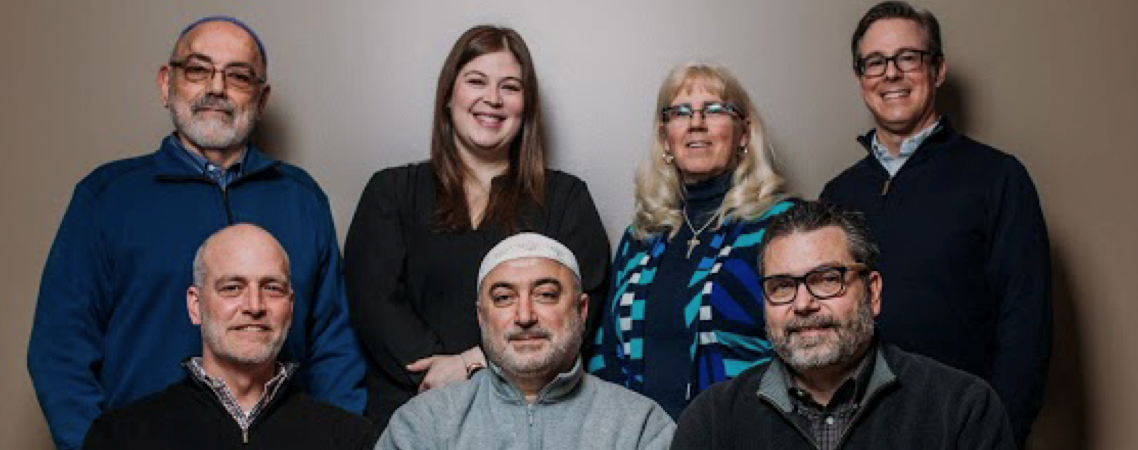Tri-Faith Initiative: Becoming Institutional Neighbors
Being Christian in Interfaith Relationships
by Chris Alexander
I am a Christian pastor participating in an interfaith conversation with Muslims and Jews; I represent a Christian partner congregation within the Tri-Faith Initiative, located in Omaha, Nebraska. This initiative began with the intentional co-location of a Christian church, a Jewish synagogue, and an Islamic mosque in order to live into what it means to be neighbors with one another in the love of God. These three faiths are recognized as “Abrahamic Faiths,” each tracing its heritage back to the same prophet, Abraham, and thus each inheritors of the same promise made to Abraham, that God would make of them a great nation.
The Tri-Faith campus –Photo: Tri-Faith Initiative
Participating as a partner in the Tri-Faith Initiative means that our congregation purchased land within the 37 acres of the Tri-Faith Commons and built a house of worship alongside a synagogue, Temple Israel, and a mosque, the American Muslim Institute. Each faith partner owns its own land and remains autonomous in its decision-making, continuing to practice its own traditions in worship and in the faith formation of its congregation. We choose to collaborate in some of our programming, doing so out of interest, curiosity, and friendship rather than out of policy or requirement. We have intentionally chosen each other as neighbors and are committed to exploring the possibilities that this relationship has in store for us.
Relationships among our communities developed long before the idea of becoming intentional neighbors. My congregation, Countryside Community Church, a congregation of the United Church of Christ, had been in interfaith conversations with Temple Israel for many years and participated with them in interfaith Thanksgiving services and community dialogues. We collaborated to bring in speakers to share from each tradition, learning from one another our unique perspectives of God in the world.
Temple Israel, through its leadership, had already built relationships within the Islamic community in Omaha as well. In the wake of the 9/11 attacks in New York, Washington D.C., and Pennsylvania, Temple Israel’s Rabbi, Aryeh Azriel, gathered several members of his congregation and others in the Omaha community to surround the mosque in order to protect it from any violence or hateful response. As a result, the relationship between the mosque and the reform Jewish congregation deepened and grew.
Tri-Faith clergy. Chris Alexander is back row, second from the right –Photo: Tri-Faith Initiative
Thus, through conversation and acts of friendship, in 2006 the idea for a Tri-Faith Initiative was born. Thirteen years in, each of the three faith partners have gained considerable insight into the practices and rituals of the other, intentionally opening to share with one another what brings us joy within each of our faiths. Additionally, members of each faith partner have developed a deeper understanding of their own faith traditions as they are now being asked to share their faith stories with others seeking understanding. The bold experiment of planting seeds of acceptance is beginning to realize the first fruits of an interactive and collaborative community, rapidly moving beyond tolerance into a mutual relationship of respect and acceptance.
Experiencing Christianity in an Interfaith Context
One of the roles I accepted as a Tri-Faith clergyperson, one that brings me great personal joy, is being in conversation with others about what the Tri-Faith is all about and the things we are learning from each other, living and growing as neighbors. Many of these conversations take place among secular community groups who are watching with interest (and perhaps a bit of skepticism) to see how this initiative might take shape and impact the overall community. Several of these conversations are also happening within other Christian churches. They are invited into Tri-Faith’s interfaith conversation to expand the Christian presence beyond the Protestant, progressive voice of our particular congregation at Countryside.
It is always a challenge to share the full spectrum of Christianity in conversations with our interfaith brothers and sisters, since our congregation is one small part of the plethora of Christian understanding, beliefs, and practices. I get a laugh every time I admit that it is often easier to have a conversation about faith with Muslims and Jews than it is to engage with other Christians about many of the same topics. But it is true.
Therefore, I always begin conversations by acknowledging that I am only speaking from my own experience within Christianity, rather than on behalf of all Christians. I do believe, however, that being the Christian partner in the Tri-Faith Initiative has put me and our congregation in a unique position of opening conversations in both the interfaith and ecumenical (relations within major traditions) arenas. I have found that one benefit of participating in interfaith collaboration is gaining the necessary conversation skills of openness and intentional listening which allow for a richer, deeper relationship among the brothers and sisters in my own Christian tradition.
Within an interfaith conversation it is often enough to identify myself simply as a Christian. But within an ecumenical conversation with other Christians I must be more specific and explain that I am a Lutheran pastor of the Evangelical Lutheran Church in America who is serving at a congregation of the United Church of Christ in Omaha. Each one of these identifiers tells my listeners something of my heritage, training, and cultural context. It’s like emerging from within a nesting doll to reveal the very core of what frames my perspectives and assumptions about God. But just as in the interfaith world, simply identifying the organizations with which I am associated does not give you a full understanding of who I am or what set of beliefs I may hold. Even within the many denominations of Christianity there is, yet again, a wide spectrum of understanding and practices.
Photo: Hippopx
Recently, I met with a group of Lutheran clergy colleagues to discuss the possibility of renewing an ecumenical network in our area. Entering conversations on a denominational level would allow a diversity of voices to come together in order to produce theological statements, to name and celebrate many of our common beliefs and practices, and to encourage collaboration in areas of social justice and outreach in our community. During the discussion, there was much conversation about inviting people from differing denominations into our congregations and having them share their stories with us. After listening to all the suggested possibilities of engagement, I offered an idea from my experience as a partner of the Tri-Faith Initiative. Instead of just inviting other Christian traditions to come to us, perhaps we might consider teaming up and sending people out to share stories about who we are and what brings us joy about being Lutheran in our world today.
It never occurred to this group that being ecumenical means more than just inviting others to share their visions with your community. It must also include disclosing something of yourself and your own beliefs and standing vulnerable in their midst. Whether it is within interfaith or ecumenical conversations, we need to share something of ourselves with one another in order to engage in an authentic relationship. It is not enough to learn about one another. We must risk disclosing that part of us that draws us into the depths of our relationship with our religious beliefs.
This understanding allows us to build bridges of acceptance within our interfaith work, as well as our collaborative, ecumenical work with those from our own faith traditions. This is the difference between talking about the other and intentionally engaging the other. We are being called to frame our vision with what Miraslov Volf, in his book Allah: A Christian Response, calls “double vision,” seeing yourself and your neighbor from their perspective.
Practicing ‘Evangelism’ in Interfaith Spaces
When I speak to other Christians about the Tri-Faith Initiative and how I believe Christianity calls us to look for the face of God in the face of the stranger, I do not always receive a healthy round of “Amen!” I believe one of the main reasons for this is the Christian tradition and practice of evangelism. A primary rule of the Tri-Faith Initiative is that there will be no proselytizing in any of our programming or within our neighborhood commons. Because of this primary agreement among our faith partners, it is important to clarify with others the difference between what it means to proselytize versus Christian evangelism.
For many Christians, evangelism begins with what is known as “The Great Commission” of Jesus to his disciples, in Matthew 28 in the New Testament:
“And Jesus came and said to them, ‘All authority in heaven and on earth has been given to me. Go therefore and make disciples of all nations, baptizing them in the name of the Father and of the Son and of the Holy Spirit, and teaching them to obey everything that I have commanded you. And remember, I am with you always, to the end of the age.’” (Verses 18-20)
Jesus, after his resurrection, sends his disciples out into the world to “make disciples,” or students, of this way of life which Jesus lived among his own followers. For many Christians, this means converting all people into Christian faith and practice so they will be saved from an eternity in hell. At a recent Christian conference discussing interfaith friendships, Dr. Bonnie Sue Lewis of Dubuque Theological Seminary explained this understanding of evangelism through a story from her childhood,
I had assumed that real friends must share at least some common understandings of the answers to ultimate questions, like life and death, good and evil, heaven and hell. I had been brought up to believe that real friends don’t let friends die without Jesus (the Great Commission trumps the Great Commandment), thus, the only purpose for interfaith friendship would be the conversion of the friend.
Dr. Lewis no longer makes this assumption in her faith journey, and many Christians would disagree with this interpretation of The Great Commission and this approach to what it means to be an evangelist.
Photo: Tri-Faith Initiative
The word evangelism comes from the Greek word in the New Testament ευαγγελίου, which in English is translated “Good News.” In my understanding of the Great Commission, Jesus is asking his disciples to share the good news that he spoke throughout his ministry, not in order to convert them to a “right” understanding, but so that they might live full and abundant lives in the love of God. To share God’s story for the purpose of converting others is to proselytize, not evangelize. The Good News, or the Gospel, as Jesus taught it, speaks to God’s love for all creation.
This telling of the “Good News” (evangelism) is exactly what we encourage among our faith communities at the Tri-Faith Initiative. We provide opportunities for our neighbors to share the joy of their beliefs and practices with their neighbors in order to celebrate the many ways God is active among us and within us as we live together in love. When done with this sincerity, Christians can celebrate a practice of evangelism with both ecumenical and interfaith friendships in a way that deepens friendship. It is precisely this freedom to love one another that is the foundation of our faith. Echoing the Hebrew Torah, Jesus tells us, in Matthew 22,
“Teacher, which commandment in the law is the greatest?’ He said to him, ‘You shall love the Lord your God with all your heart, and with all your soul, and with all your mind.’ This is the greatest and first commandment. And a second is like it: ‘You shall love your neighbor as yourself.’ On these two commandments hang all the law and the prophets.” (Verses 36-40)
Let it be so.
Header Photo: Hippopx






